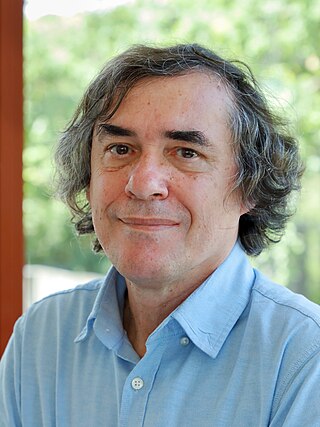Romanian literature is the entirety of literature written by Romanian authors, although the term may also be used to refer to all literature written in the Romanian language or by any authors native to Romania.

The University of Bucharest (UB) is a public research university in Bucharest, Romania. It was founded in its current form on 4 July 1864 by a decree of Prince Alexandru Ioan Cuza to convert the former Princely Academy into the current University of Bucharest, making it one of the oldest Romanian universities. It is one of the five members of the Universitaria Consortium.

Mircea Cărtărescu is a Romanian novelist, poet, short-story writer, literary critic, and essayist.

Humanitas is an independent Romanian publishing house, located at Piața Presei Libere 1, Bucharest. It was founded on February 1, 1990 by the philosopher Gabriel Liiceanu, based on a state-owned publishing house, Editura Politică. Its slogan is Humanitas, bunul gust al libertății.
Onirism was a surrealist Romanian literary school most popular during the 1960s, in the wake of popular uprisings in Eastern Europe. One of the techniques it employed was automatic writing.

Klaus Ebner is an Austrian writer, essayist, poet, and translator. Born and raised in Vienna, he began writing at an early age. He started submitting stories to magazines in the 1980s, and also published articles and books on software topics after 1989. Ebner's poetry is written in German and Catalan; he also translates French and Catalan literature into German. He is a member of several Austrian writers associations, including the Grazer Autorenversammlung.

Ruxandra-Mihaela Cesereanu or Ruxandra-Mihaela Braga is a Romanian poet, essayist, short story writer, novelist, and literary critic. Also known as a journalist, academic, literary historian and film critic, Cesereanu holds a teaching position at the Babeș-Bolyai University (UBB), and is an editor for the magazine Steaua in Cluj-Napoca.

Nostalgia is a novel by the Romanian writer Mircea Cărtărescu.

Mircea Nedelciu was a Romanian short-story writer, novelist, essayist and literary critic, one of the leading exponents of the Optzeciști generation in Romanian letters. The author of experimental prose, mixing elements of conventional narratives with autofiction, textuality, intertextuality and, in some cases, fantasy, he placed his work at the meeting point between Postmodernism and a minimalist form of Neorealism. This approach is illustrated by his volumes of stories and his novels Zmeura de cîmpie, Tratament fabulatoriu, and by Femeia în roșu, a collaborative fiction piece written together with Adriana Babeți and Mircea Mihăieș.
Horia-Răzvan Gârbea or Gîrbea is a Romanian playwright, poet, essayist, novelist and critic, also known as an academic, engineer and journalist. Known for his work in experimental theater and his Postmodernist contributions to Romanian literature, he is a member of the Writers' Union of Romania (USR), its public relations executive and the head of its Bucharest chapter. Also recognized for his contribution to Romanian humor and his essays, he has published regularly in journals such as Contemporanul, Luceafărul, Ramuri, and Săptămâna Financiară. His career in the media also covers screenwriting for Romanian television stations and the popularization of contract bridge. The author of several scientific works on engineering, Gârbea is also a faculty member at the University of Agronomical Sciences and Veterinary Medicine.

Alexandru Robot was a Romanian, Moldovan and Soviet poet, also known as a novelist and journalist. First noted as a member of Romanian literary clubs, and committed to modernism and the avant-garde, he developed a poetic style based on borrowings from Symbolist and Expressionist literature. Also deemed a "Hermeticist" for the lexical obscurity in some of his poems, as well as for the similarity between his style and that of Ion Barbu, Robot was in particular noted for his pastorals, where he fused modernist elements into a traditionalist convention.

Blinding is a novel in three volumes by the Romanian writer Mircea Cărtărescu. It consists of the installments Aripa stângă from 1996, Corpul from 2002, and Aripa dreaptă from 2007. An English translation of the first volume was published in October 2013.

Why We Love Women is a 2004 short story collection by the Romanian writer Mircea Cărtărescu. The twenty stories all have a female protagonist, and had previously been published in the magazine Elle. The book was published in English in 2011 through University of Plymouth Press.

The Levant is a 1990 epic poem by the Romanian writer Mircea Cărtărescu. Consisting of twelve cantos in verse, the narrative begins in the early 19th century, and follows a band of Wallachian adventurers and pirates, who return to their native land in an attempt to overthrow an oppressor. Cărtărescu uses the poem to highlight oriental influences in Romanian culture.

The Encyclopedia of Dragons is a 2002 book by the Romanian writer Mircea Cărtărescu, with illustrations by Tudor Banus. It focuses on dragons in Romanian folklore, and includes ten short stories about dragons. Cărtărescu groups it with his books Why We Love Women and Beautiful Strangers as a trilogy of prose with lower literary ambition.
"Beautiful Stranger" is a 1999 single by Madonna.
Mircea Damian was a Romanian prose writer and journalist.

Mircea Zaciu was a Romanian critic, literary historian and prose writer.
Istros books is a London-based independent publisher of writers from South-East Europe and the Balkans, in English translation. It was set up in 2011 by Susan Curtis.
Solenoid is a 2015 novel by Mircea Cărtărescu written in the 2010s and, according to Cărtărescu, in a single draft without revision. The English translation by Sean Cotter was published in 2022.












